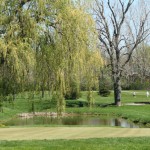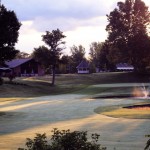As golf season winds down in Buffalo-Niagara, our attention turns to domes, trips and television. You have domes and your remote control device within reach, so leave the rest to me. I’m going to give offer up a nine-part series on eclectic eighteens across the USA. The only thread tying them together is my having played them. That, and the fact that all of the courses are worthwhile. You’ll never play them all in one sweep, as I once did, but when you find yourself in these regions, know that these courses are worth your money and your best game.
Tunica National in Tunica, Mississippi
Tunica National was designed by the Mark McCumber architectural firm and was opened in 2004. The course is located near the Tunica casino properties, south of Memphis and along the Mississippi river. The golf course offers the wide fairways associated with a resort course. You can get into trouble, but you’ll have to work at it. McCumber and team tossed a few tricky holes into the mix, of the type where you think too long about taking the short cut, then actually try to take it…and pay the price. Play to the wide side of the fairway and you’ll always leave yourself a shot into the green. The putting surfaces are quite large and not very steep. Your distance putts will have little break, so gauging the speed is the critical factor. The Tunica land is farmland flat, and the golf course does not rise and fall noticeably. The course is filled with ponds, but they are not intrusive in the ball-stealing way. Again, if you are wild in a lateral fashion, you will donate six or so golf balls to Davy Jones locker, but only if you are wild. Tunica National’s main source of defense is the wind. When it blows, there are few trees to deter its power and golfers without the ability to hit the low ball, and to maintain a solid base, will have fits.
Butterfield Trail in El Paso, Texas
Tom Fazio and his team opened Butterfield Trail in 2007. The land on which it sits is flat scrub land, adjacent to the El Paso International Airport. The topography of Butterfield Trail suggests a location closer to the hills surrounding the city, as the fairways meander up and down, then rise to a mesita where the green is located. Along some fairways are gaping, sandy pits from which recovery is more than a notion. The putting surfaces are enormous and typically have a principal slope that is visible from the fairway. Fazio was subtle enough to incorporate side fall-offs in his greens, leading to recovery areas cut short for chipping or the Texas wedge.
If you know Tom Fazio golf courses, you’ll wonder at this one. Butterfield Trail looks and plays like a southwest course. The sand is tan in hue, unlike the white crystals usually found in Fazio bunkers. The entire course simulates a hike or a ride across the terrain for which the course is named. The Butterfield Trail was a Pony Express-type mail run in the old American west. There’s nothing jagged or jarring about the course; all of the bunker edges and fairway traces are reminiscent of those found naturally in the area. Fazio had the foresight to remain true to the region and his attention to detail was rewarded.
As it is a municipal golf course, Butterfield Trail cannot be a beast in the style, say, of a Bethpage Black. The Black course has four other courses of lesser demand on property, so it can be the US Open challenge that it is. Butterfield Trail has to have a soft spot, in order to reward handicap golfers who successfully navigate from tee to green. That soft spot is the general run of the putting surfaces. Although the greens are tilted, they rarely have the nuanced, internal contours that beguile average golfers. A general break is what you find, and that’s a good thing. If you drive into a fairway bunker, play out and wedge to the green with your third. Chances are excellent that you’ll have a putt at par, and a bogey at worst.
Conclusion
Both Tunica National and Butterfield Trail are worth a stop if you find yourself in the area. Neither is part of a destination sequence, so you probably won’t end up in either place solely for the golf. Both courses are worthy of second and third plays; such is their diversity and appeal.










